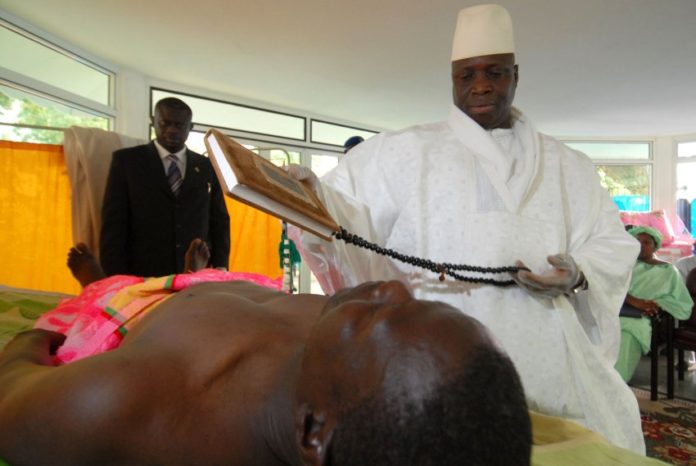For a president who claimed to have supernatural powers, it was just another example of his benign magical touch.
But when Gambia’s witchcraft-practising dictator, Yahya Jammeh, declared to the world in 2007 that he had invented a miracle cure for HIV, the response was not ridicule but horror.
Not only did his mystic recipe only work on Mondays and Thursdays, it required patients to give up anti-retrovirals in favour of a yellow herbal concoction.
Yet while medical experts condemned it as dangerous quackery, that was not an option for Lamin Ceesay, one of an estimated 9,000 HIV-positive Gambians offered places in the president’s HIV “clinic”.
Too scared of Mr Jammeh to turn the invite down, Mr Ceesay spent six months there, watching others on the program fall ill and die – including his wife.
Now, a year after Mr Jammeh’s fall from power, Mr Ceesay and other Gambians conscripted onto the treatment programme have launched a new campaign to take legal action against him for abuse of their human rights.
They claim that hundreds or even thousands of patients died, and that others may have spread HIV further after Mr Jammeh declared them “cured” of the virus.
Mr Jammeh fled to exile in Equatorial Guinea in January, after the regional ECOWAS power bloc threatened to remove him by force if he did not step down peacefully. He had lost elections the previous November, in what was seen a massive protest vote against his increasingly autocratic rule.
His most high-profile act of shamanism, though, was his HIV cure. According to Mr Jammeh, it relied on a “secret” recipe of different herbs that God had told him alone how to make.
To prove to a sceptical world that it worked, he approached the Santa Yalla Society, an HIV support group in Gambia where Mr Ceesay worked, and asked for volunteers for a six-month course.
“My doctors had told me that herbal cures didn’t work,” said Mr Ceesay, who caught the virus while working in Cameroon. “But I thought if I didn’t go myself, I might get into trouble.”
Upon enrolling on the programme at State House, Mr Ceesay and his fellow guinea pigs were told first to avoid smoking, caffeine, soft drinks or sex. They were fed twice a day with bitter-tasting greenish-yellow liquids that were kept in Evian mineral water bottles.
The president himself would also massage a green paste onto their bodies, while muttering prayers. Meanwhile, teams of his ever-present entourage of menacing bodyguards kept watch at all times, preventing anyone leaving until the course was over.
“Nobody ever explained what we were taking, but the medicine gave me constant diarrhoea and eventually I started getting very sick,” Mr Ceesay said. “I also caught tuberculosis off another patient in the clinic.”
Eventually, he became so ill that he was taken to a regular hospital, where a doctor who knew him said he was barely recognisable because of his weight loss. He then went back on the program, where a blood test later confirmed that his HIV viral load had skyrocketed.
After his discharge from the clinic in July 2007, his regular doctors put him back on ARVs. His wife, however, who was also on the program, died.
“Whether it was lack of ARVs that killed her or the herbal medicine itself, I don’t know,” Mr Ceesay said. “But when Mr Jammeh held a ceremony to celebrate the program’s first year of running, I stayed away.”
Less able to avoid the limelight was fellow HIV patient Ousman Sowe, 64, who had a degree in public health from the University of Leeds. Hoping that someone with a British university qualification could confer respectability on his claims, Mr Jammeh recruited Mr Sowe as the clinic’s spokesman, making him sing its praises before the media.
In one 2007 interview with the BBC, Mr Sowe said he had “100 per cent confidence” in the cure. In reality, stopping his course of ARVs left him so weak that he could barely climb stairs.
“As an educated person, I knew it was all rubbish,” Mr Sowe added. “But I couldn’t say anything against it, even though people were dying.”
Despite widespread international condemnation of the programme, an estimated 9,000 people underwent it until Mr Jammeh’s downfall last year. Ironically, many of them got their regular ARV treatments from doctors at the Medical Research Council, a UK-funded scientific body that has its west African HQ in Gambia.
The council’s medics were wary of raising objections to the herbal programme because of fears that Mr Jammeh would shut their research centre down. UN health officials who had done so were ordered out of the country.
Exactly how many people died in the clinic remains unknown, as the only information Mr Jammeh ever authorised about it were propaganda show-reels showing patients claiming to have been cured. But Mr Sowe believes that the “majority” did not survive. “I was attending funerals all the time,” he said.
The HIV patients’ case has now been taken up by AIDs-Free World, a US advocacy group that plans to bring both criminal and civil cases against Mr Jammeh.
While any rulings may be difficult to enforce in Equatorial Guinea – where he has asylum from fellow dictator Teodoro Obiang – the group’s co-director, Paula Donovan, believes the legal action will at least encourage other patients to come forward.
More widely, human rights groups are also planning a diplomatic push to pressurise Mr Obiang to hand Mr Jammeh back to trial.
“There should always be a voice to challenge this kind of thing,” said Mr Sowe. “We owe this to future generations of Gambians to make sure nothing like should happen again.”
Source: Telegraph, UK




